Probate, executors & dealing with an estate
Last reviewed March 2024 by the Clicklaw editors
Probate is the process of handling an estate after someone dies if that person had a will. The executor follows the will’s instructions for their assets and property. If there isn’t a will, the process is similar, and it’s called administration.
There are extra things to consider in situations such as when a common-law spouse dies, or the estate is on reserve land.
Explore the links below to reliable online guides and tools and to organizations in BC. They have been chosen by librarians at Courthouse Libraries BC.
Selected resources
Click on a topic to see a list of resources.
|
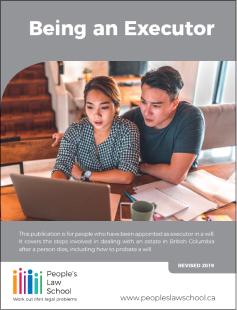
Being an Executor
People’s Law School
A booklet for people who have been appointed as executor in a will. It covers the steps involved in dealing with an estate in British Columbia after a person dies, including how to probate a will. The information is current to March 2019.
Last reviewed March 2024

Wills Registry
Vital Statistics Agency (Government of BC)
A “wills notice” identifies that a will has been registered and describes the person who made the will, where it’s located, and the date of the will. This website explains how to file one, how to search for one, and when to request one.
Last reviewed March 2024
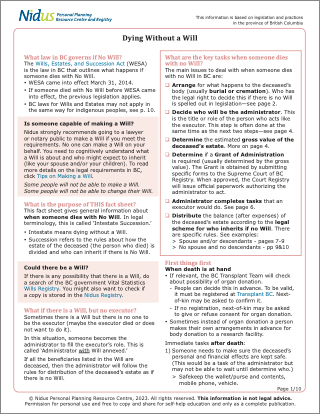
Dying Without a Will
Nidus Registry
Nidus encourages everyone to make a will. However, there are some situations where an individual may be considered not mentally capable to make a will. This fact sheet explains who has legal authority to settle an estate and gives examples of how an estate must be distributed if there is no will.
Last reviewed March 2024
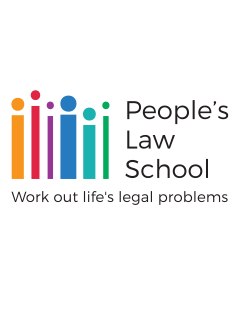
Dying Without a Will
People’s Law School
Practical information for when someone dies without a will. Topics include who inherits the deceased’s property, steps to settling the estate, applying for a grant of administration, and more.
Last reviewed March 2024

Applying for a Grant of Administration
People’s Law School
You need to apply for a grant of administration to deal with an estate if the executor does not want to, or if there was no will. The page explains when to apply, what’s involved, the fees, how long it takes, and what to do if your application is rejected. It provides step-by-step instructions on how to apply (and links to the forms).
Last reviewed March 2024

Wills Registry
Vital Statistics Agency (Government of BC)
A “wills notice” identifies that a will has been registered and describes the person who made the will, where it’s located, and the date of the will. This website explains how to file one, how to search for one, and when to request one.
Last reviewed March 2024

Represent Someone Who Died (Also Known as Probate)
Government of British Columbia
This tool helps people fill out the court forms to apply for a representation grant from the Supreme Court of British Columbia when the deceased didn’t leave a will.
Last reviewed October 2024

Wills & Estates (Q&A)
People’s Law School
Questions and answers on wills-and-estates topics. Volunteer legal professionals provide answers to questions from the public relating to wills, dealing with death, settling an estate, and personal planning.
Last reviewed March 2024

Dial-a-Law: When Your Common-Law Spouse Dies
People’s Law School
Explains your rights, and what you’re entitled to, if your common-law spouse dies. It explains the different definitions of “spouse,” and describes what happens if your spouse left a will, or if they died without a will. It explains pension, survivor, and CPP benefits. It also explains custody and guardianship of children.
Last reviewed March 2024
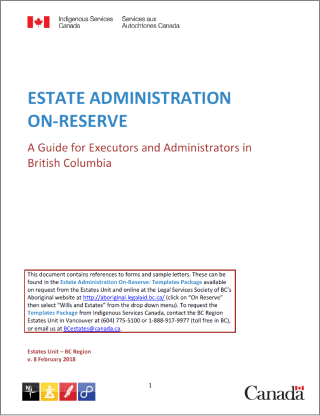
Estate Administration On-Reserve: A Guide for Executors and Administrators in British Columbia
Government of Canada
Guide for people appointed by Indigenous Services Canada as the executor or administrator of the estate of a family member or friend who has passed away.
Last reviewed May 2024
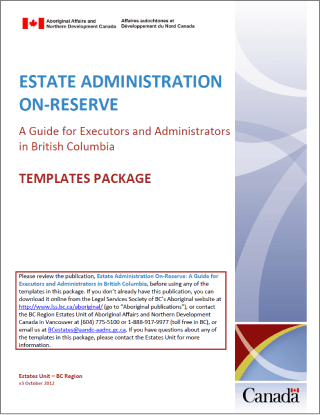
Estate Administration On-Reserve: Templates Package
Government of Canada
Contains generic templates to help with the routine tasks of administering a simple estate under the Indian Act. It’s intended to be used with the booklet “Estate Administration On-Reserve: A Guide for Executors and Administrators in British Columbia.”
Last reviewed May 2024
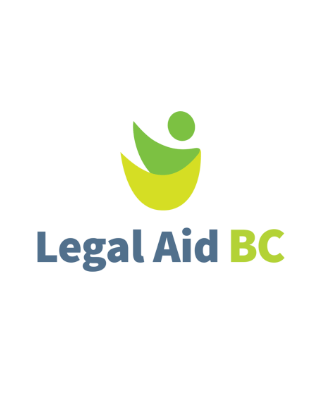
Wills and Estates on Reserve
Legal Aid BC
Describes how wills and estates on reserve are different from those off reserve for status Indians who ordinarily lived on reserve at the time of their death.
Last reviewed March 2024

Dealing with an Estate
People’s Law School
Practical, step-by-step information about what you need to know when dealing with an estate. Learn what is involved if you are asked to be an executor, the ten steps to settle an estate, and the steps to take if you need to probate the will.
Last reviewed March 2024
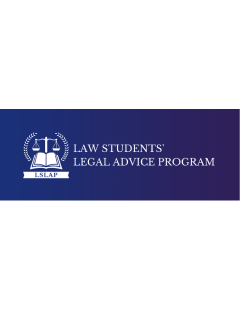
LSLAP Manual: Wills and Estate Administration
Law Students’ Legal Advice Program (LSLAP)
From the manual used by law students handling cases at LSLAP’s legal clinics. Provides a breakdown of common provisions included in wills. Also covers the execution of wills, and the administration and distribution of estates.
Last reviewed September 2024